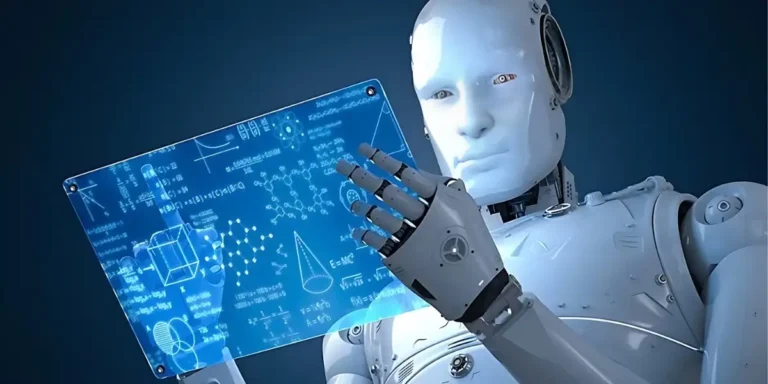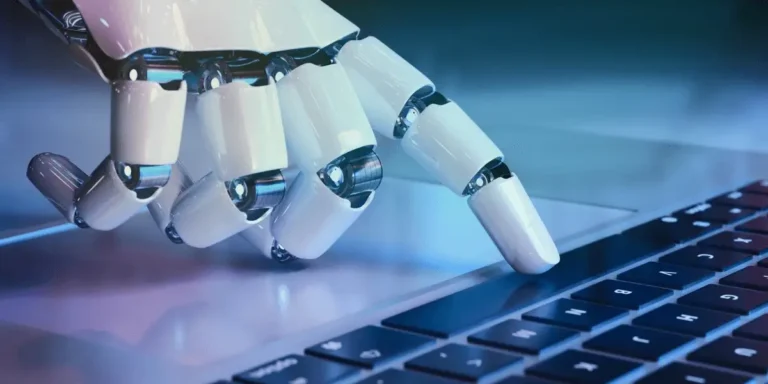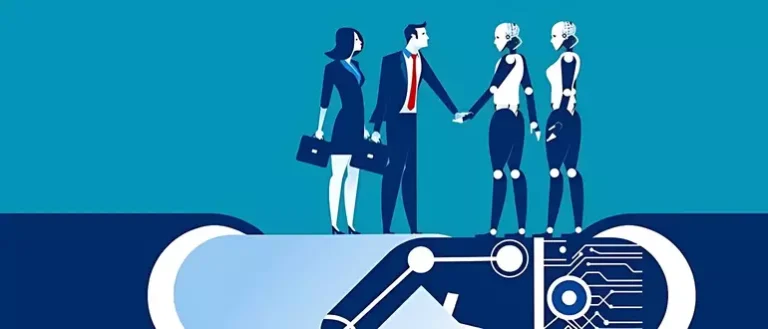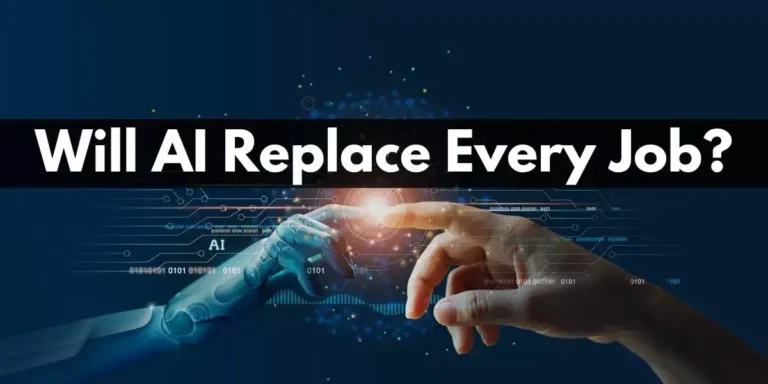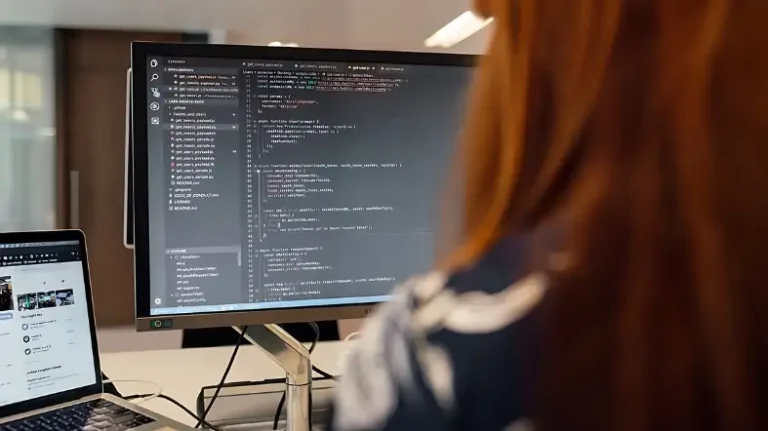As artificial intelligence (AI) continues to advance, there is growing concern among software developers about the possibility of losing their jobs to machines.
With the ability of AI to learn and improve over time, it’s natural to wonder if AI will replace software developers altogether.
In this blog post, we’ll explore this question and look at the current state of AI and software development to see if this concern is valid.
We’ll also cover following:
- Future of AI in this sector
- Implication of AI in Software Development
Advantages, Challenges and Limitation of AI in this industry.
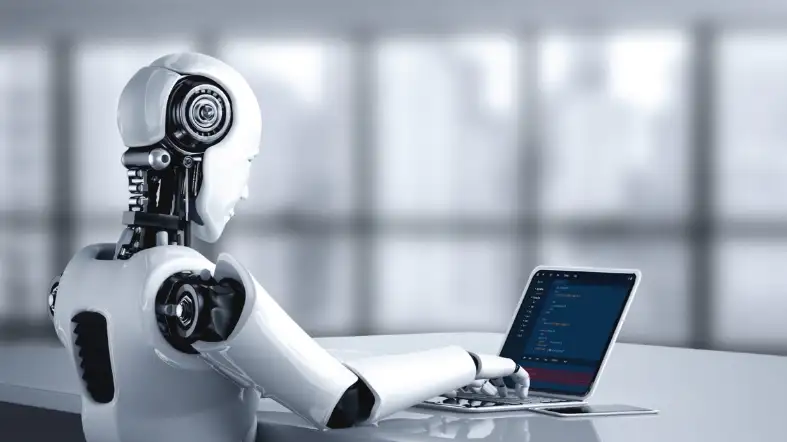
Will AI Replace Software Developers?
No, AI is unlikely to fully replace high-value software engineers who build complex and innovative software.
AI can assist in certain tasks, but it’s important to use it responsibly with human oversight to ensure effective and ethical software development.
Both AI and software engineering offer benefits for improving efficiency and productivity.
The Current State of AI in Software Development
Overview of AI technologies used in software development
AI has revolutionized software development, giving developers new tools and opportunities.
McKinsey & Company found that enterprises used 1.9 AI capabilities in 2018 and 3.8 in 2022.
Software developers employ natural-language generation, robotic process automation, and computer vision.
Chatbots, virtual assistants, and other conversational tools can be made using natural language generation.
Robotic process automation can automate data entry, freeing developers to focus on more important software development duties.
Computer vision lets software systems recognize images and detect objects.
AI-driven automation in coding and testing processes
AI has significantly impacted software development’s coding and testing processes, making them more efficient and accurate.
According to a report by Deloitte, AI-assisted software development can help companies innovate by developing critical software solutions in-house.
Some of the AI-driven automation tools used in coding and testing processes include:
- Code generation: AI can assist developers in writing code by generating new code or suggesting improvements to existing code.
- Code optimization: AI can optimize code to improve its performance and efficiency.
- Debugging: AI can help identify and fix errors in the code, allowing developers to save time and improve software quality.
- Testing: AI can automate the testing process, allowing developers to test their software more thoroughly and quickly.
Examples of successful AI applications in software development
AI has been successfully used in various software development projects, including chatbots, image recognition, and natural language processing.
Here are a few examples of successful AI applications in software development:
Google’s TensorFlow:
TensorFlow is an open-source software library for dataflow and differentiable programming.
It is widely used in developing and deploying machine learning models and has been used in various applications such as speech recognition, image and video analysis, and natural language processing.
Amazon’s Alexa:
Alexa is a voice-activated virtual assistant developed by Amazon. It uses natural language processing and machine learning to understand voice commands and answer questions.
Microsoft’s CodePlex AI:
CodePlex AI is an AI-powered tool that assists developers in writing code by suggesting improvements and predicting the next lines of code.
This tool saves developers’ time and helps them write code more efficiently.
The Future of AI and Software Developers
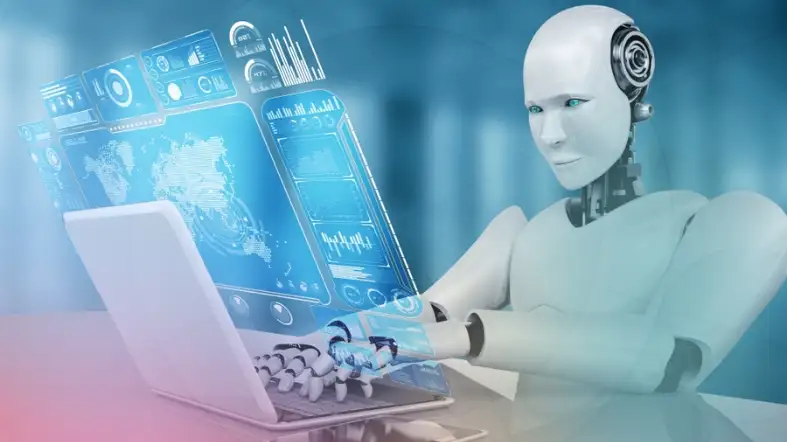
AI as a complement to software developers:
The future of AI and software developers is more about collaboration between the two than replacing one with the other.
GitHub Copilot, for instance, is a prime example of how AI is being used to generate code on behalf of developers, making the process more efficient and accurate.
AI could serve as a tool to complement the work of developers by assisting them in routine tasks such as code debugging and refactoring.
This would allow developers to focus on more challenging and creative tasks, thereby enhancing their productivity and overall output.
Collaboration between AI systems and human developers:
In the future, AI systems could work alongside human developers in a more collaborative manner, assisting them in various tasks throughout the software development lifecycle.
AI systems could help in generating and testing code, providing real-time feedback on the code quality, and even identifying potential security vulnerabilities.
The integration of AI systems into the software development process could significantly improve the speed, accuracy, and efficiency of development, allowing developers to create better software in less time.
Evolution of software development roles and skillsets:
As AI continues to penetrate the software development landscape, traditional software development roles and skillsets may evolve.
Developers may need to acquire new skills such as machine learning, data science, and natural language processing to work effectively with AI systems.
Furthermore, integrating AI systems could lead to new roles such as AI trainers, responsible for training AI models, and AI explainers, responsible for interpreting AI models and their outputs.
Opportunities for upskilling and specialization in AI-driven software development:
With the increased adoption of AI in software development, developers will need to upskill and specialize in AI-driven software development.
Upskilling could be achieved through online courses, certification programs, and on-the-job training.
Specialization in AI-driven software development could lead to more job opportunities, higher pay, and more challenging and exciting work.
Implications of AI for the Software Development Industry
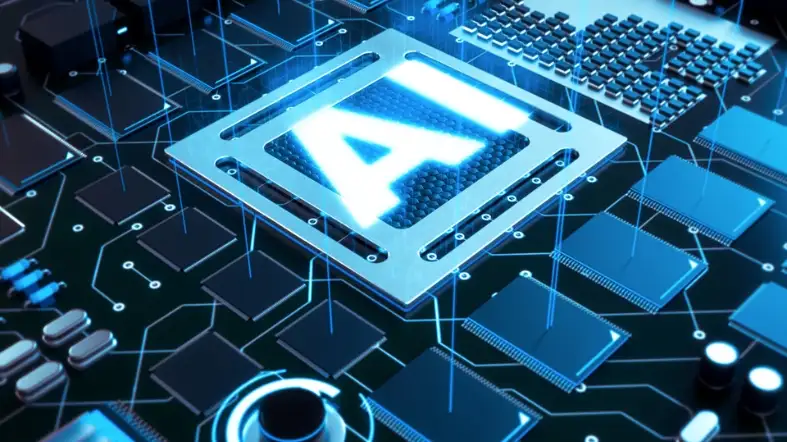
Job Market Outlook for Software Developers in the Age of AI
The demand for software developers is growing rapidly, with many companies looking to hire more developers in 2022 than ever before.
The pandemic has accelerated the demand for software developers, with a significant increase in tech occupations in December 2020, with software developer and application developer roles accounting for the largest share of new postings.
However, the AI and automation revolution will have an impact on the software development industry, which could result in job losses in some areas.
Therefore, software developers need to be adaptable and willing to learn new skills.
Industries Most Likely to be Affected by AI-Driven Automation
While AI-driven automation will impact many industries, some sectors will be more affected than others.
For example, industries that rely heavily on repetitive tasks are more likely to be automated. These include the manufacturing, retail, and transportation industries.
In contrast, the healthcare, finance, and education sectors are less likely to be impacted by AI-driven automation because these industries require more human interaction and decision-making skills.
Importance of Adaptability and Continuous Learning for Software Developers
To thrive in the age of AI, software developers need to be adaptable and willing to learn new skills continuously.
They need to keep up with the latest developments in AI and automation and learn how to integrate these technologies into their work.
Additionally, software developers need to be willing to learn new programming languages and frameworks to remain competitive in the job market.
Strategies for Software Developers to Thrive in the AI Era
Learn AI and Automation Skills:
To thrive in the age of AI, software developers need to learn AI and automation skills.
They should learn how to integrate these technologies into their work and develop applications that leverage AI and automation.
Specialize in High-Demand Areas:
Developers can specialize in high-demand areas, such as machine learning, natural language processing, and computer vision, to increase their job opportunities.
Build a Strong Professional Network:
Building a strong professional network can help developers learn about new job opportunities and stay up-to-date with the latest developments in the industry.
Take Advantage of Training and Learning Opportunities:
Developers should take advantage of training and learning opportunities to keep their skills up-to-date.
Many companies offer training programs, and there are also many online courses and resources available.
Stay Up-to-Date with Industry Trends:
To remain competitive in the job market, developers need to stay up-to-date with industry trends.
They should read industry publications, attend conferences and events, and follow industry leaders on social media.
Advantages of AI in Software Development
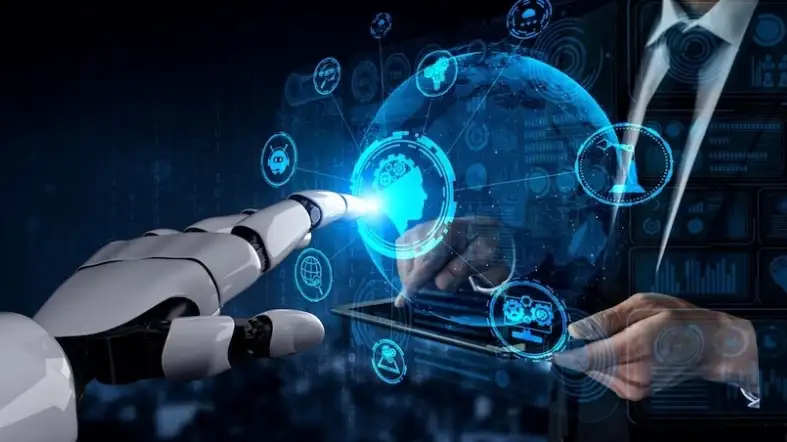
Increased efficiency and productivity
- One of the most significant benefits of AI in software development is increased efficiency and productivity.
- AI can handle tasks at a scale and pace that is impossible for humans to match. It can automate routine tasks such as testing, debugging, and code optimization.
- This automation saves time and resources and enables developers to focus on more complex tasks, such as designing and implementing new features.
Accelerated software development cycles
- AI can accelerate the software development cycle by automating tasks that were previously performed manually.
- For example, AI can be used to generate code, reducing the time and effort required to write it from scratch.
- It can also be used to detect bugs and errors early in the development process, which can save significant time and resources by avoiding the need to rewrite code later.
Reduction of human error and debugging processes
- Another advantage of AI in software development is the reduction of human error and debugging processes.
- AI can identify and fix errors in the code, reducing the need for manual debugging.
- This saves time and reduces the risk of introducing new bugs into the code while debugging.
Improved code quality and performance
- AI can improve the quality and performance of code by optimizing it for specific hardware and software configurations.
- For example, AI can be used to optimize code for mobile devices, ensuring that it runs smoothly and efficiently.
- AI can also be used to detect and remove redundant code, making the software lighter and faster.
Challenges and Limitations of AI in Software Development
Ethical Considerations and potential biases in AI Algorithms
AI algorithms can make decisions based on statistical patterns and correlations in data, but these patterns may not always reflect the real-world situations they are meant to model.
As a result, AI algorithms can sometimes produce biased or discriminatory results, perpetuating existing inequalities and injustices in society.
Some potential signs that an AI algorithm may be biased include the following:
- If the algorithm disproportionately affects certain groups of people based on their race, gender, age, or other protected characteristics.
- If the algorithm produces outcomes that go against common sense or human intuition, indicating that it may be relying on spurious correlations in the data.
- If the algorithm’s results are difficult to explain or interpret, making it hard to understand why certain decisions were made.
- If the algorithm’s training data is biased, incomplete, or unrepresentative of the real-world situations, it is meant to model.
For instance, a facial recognition algorithm trained on mostly white faces may struggle to distinguish darker-skinned people.
This could lead to misidentification, unlawful arrests, or other significant repercussions.
An AI-powered hiring tool trained on historical data may also unintentionally perpetuate gender or racial biases.
The complexity of software development tasks requiring human creativity and intuition
Software development is a complex and creative process involving much trial and error, iteration, and human intuition.
While AI algorithms can be useful for automating repetitive or routine tasks, they may struggle to replicate human developers’ nuanced decision-making and problem-solving skills.
Some potential signs that an AI algorithm may struggle with software development tasks requiring human creativity and intuition include:
- If the algorithm’s outputs are formulaic or predictable, lacking the creativity or innovation that human developers bring to the table.
- If the algorithm struggles to understand or interpret the goals and objectives of a software development project, leading to misalignment or miscommunication with human stakeholders.
- If the algorithm produces results that are difficult to integrate with existing software systems or infrastructure, leading to compatibility issues or other technical challenges.
An AI system creating a user interface may struggle to understand diverse user groups’ varied tastes and needs.
An AI-powered code review tool may not detect minor defects or security issues that require human intuition and skill.
AI limitations in understanding complex business requirements
Software development often involves complex business requirements, such as regulatory compliance, data privacy, and security.
While AI algorithms can be useful for automating certain aspects of these requirements, they may struggle to understand the full scope and complexity of the business context in which they operate.
Some potential signs that an AI algorithm may struggle with complex business requirements include the following:
- If the algorithm produces results that are not aligned with the broader strategic goals or objectives of the business, leading to inefficiencies or missed opportunities.
- If the algorithm fails to take into account the regulatory or legal constraints that apply to the software development project, leading to compliance issues or legal liabilities.
- If the algorithm produces results that are not in line with the ethical values or principles of the business, leading to reputational harm or other negative consequences.
An AI-powered chatbot that interacts with clients may struggle to comply with data privacy standards when handling sensitive or secret information.
An AI computer making investment decisions may not grasp economic or social factors.
FAQs
What Role Will AI Play In The Future Of Software Development?
AI will undoubtedly play a significant role in the future of software development.
AI will likely become more adept in software development roles and continue to advance over time, but developers and software engineers will also seize the opportunities presented by AI and use AI assistance to aid them in their work.
What Aspects Of Software Development Can AI Currently Automate?
AI can currently automate certain repetitive and time-consuming tasks in software development, such as debugging and testing.
However, AI is not yet capable of fully replacing human developers in more complex and creative tasks.
Will AI Reduce The Demand For Software Developers In The Future?
While AI may potentially automate certain aspects of software development, it is unlikely to reduce the demand for human developers in the near future.
In fact, the increasing adoption of AI in software development may lead to an increase in demand for developers who are skilled in AI and can work alongside AI systems.
Will AI Make Software Development Easier?
AI has the potential to make certain aspects of software development easier, such as automating repetitive tasks and providing assistance with coding and debugging.
However, AI is not a complete solution and will still require human developers to oversee and manage the development process.
Conclusion
AI is progressing rapidly and is being employed in some software development, but it won’t replace humans anytime soon.
Software creation requires creativity, insight, and problem-solving talents that AI cannot mimic.
AI may help developers work more efficiently rather than replacing them. Software engineers need not worry about AI replacing them anytime soon.
